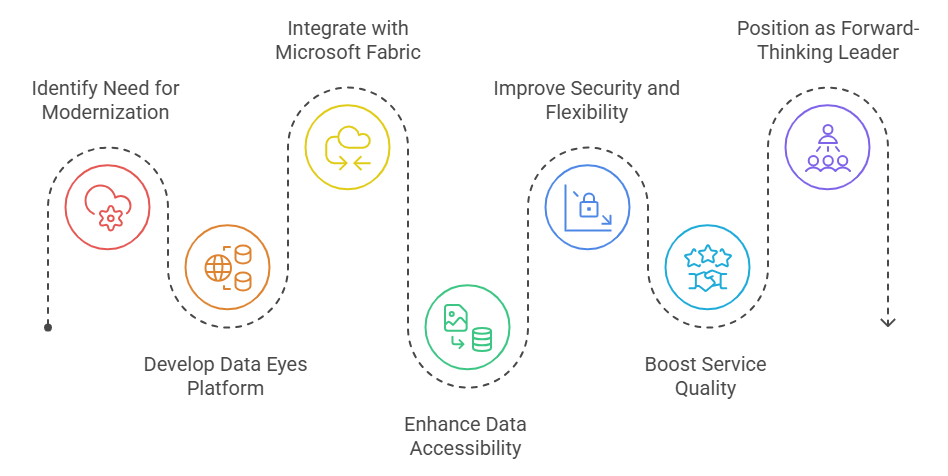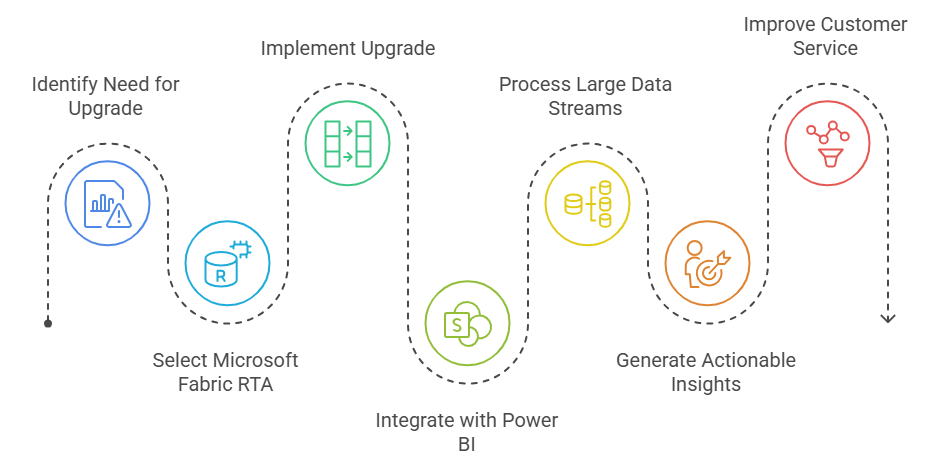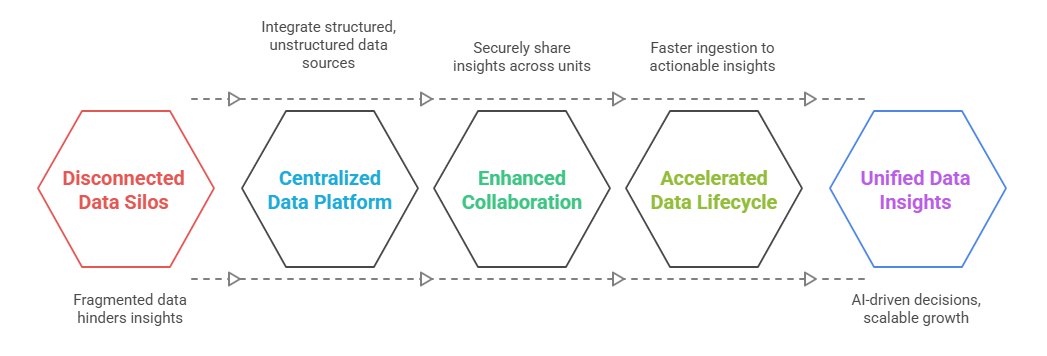What if one platform could simplify your entire data journey and drive real business results? Microsoft Fabric is doing just that for companies across industries. From breaking down silos to delivering faster insights, it’s transforming the way teams work with data. In this article, we will explore the top 5 real-life Microsoft Fabric case studies that showcase its powerful impact. If you’re thinking about leveling up your data strategy, this is the inspiration you need.
BDO Belgium Elevates M&A Insights with Microsoft Fabric
BDO Belgium, a prominent advisory and accounting firm, sought to modernize its Mergers and Acquisitions (M&A) analytics, which were limited by outdated systems that lacked speed and scalability. To resolve this, the firm developed Data Eyes, a dynamic analytics platform powered by Microsoft Fabric.
By integrating Data Eyes with Microsoft Power BI, BDO created an intuitive, no-code environment that allowed finance professionals to analyze large datasets without delays. The cloud-native architecture of Fabric eliminated performance bottlenecks often faced with on-premises solutions, enabling faster, more reliable access to client data.
“With Fabric, we can dive deep into data and uncover root causes without delays, says Van Aerschot from BDO”. The solution not only improved data accessibility but also enhanced security and flexibility, which are key factors in handling sensitive M&A information. This digital shift allowed BDO to provide deeper insights and faster turnaround times to its clients, directly boosting service quality and satisfaction.
The transformation marks a significant leap for BDO Belgium, positioning Microsoft Fabric at the core of its data strategy and reinforcing its role as a forward-thinking leader in advisory services. The firm is now considering Microsoft Fabric training to ensure that internal teams stay aligned with evolving capabilities and can maximize the platform’s benefits.

ZEISS Group Unifies Data Strategy and Accelerates Innovation with Microsoft Fabric
ZEISS Group, a global leader in optical technology and innovation, faced the challenge of managing growing volumes of data trapped in disconnected systems. To gain a unified view across its analytics workflows and empower AI-driven decision-making, ZEISS introduced eVA, a next-generation enterprise analytics platform powered by Microsoft Fabric.
By adopting Microsoft Fabric on Azure, ZEISS eliminated fragmented data silos and achieved seamless integration across structured and unstructured data sources. The cloud-based architecture enabled business units to collaborate effortlessly using a trusted data foundation, reducing the need for redundant infrastructure and improving agility.
“Fabric provides the infrastructure we need to securely share insights across business units, says Markus Morgner, Head of Enterprise Data Platform & Engineering at ZEISS”. With Fabric, ZEISS can accelerate the entire data lifecycle, from ingestion to insight, supporting innovation in industries from healthcare to automotive through more responsive and intelligent data services.
This data transformation highlights ZEISS Group’s long-standing commitment to technical excellence, with Microsoft Fabric now playing a central role in the company’s analytics vision. The move sets the foundation for scalable, AI-powered growth and reinforces ZEISS’s mission to continuously inspire innovation and clarity around the world.
Hitachi Solutions Transforms Data Operations with Microsoft Fabric
Hitachi Solutions North America, a leader in digital transformation, faced increasing complexity in managing consultant workloads across 70+ Data and AI projects. Tracking employee hours and optimizing resource utilization had become time-consuming and inefficient. To overcome this, the company opted for a Microsoft Fabric implementation to upgrade its data infrastructure and enhance visibility, governance, and efficiency.
By adopting a semantic model within Microsoft Fabric, Hitachi optimized data sharing, eliminated redundant logic, and strengthened security. “With Fabric, we’ve automated many manual processes, says Cary Holley, VP of Data and AI”. “Everything is now online with robust governance, so I can quickly identify resource needs.” This change enabled real-time decision-making and significantly improved project planning.
Hitachi also leveraged Power BI and Copilot to generate real-time analytics and automate reporting. These tools empowered teams to uncover insights quickly and make informed decisions. The improved setup enhanced collaboration and helped allocate resources efficiently across active projects. Future plans include deeper integration of AI-driven analytics into Microsoft Fabric to further strengthen operational agility. With Microsoft Fabric, Hitachi has transformed raw data into actionable insights, reducing overhead and boosting productivity across its Data and AI division.

Alltech Modernizes Travel Spend Analytics with Microsoft Fabric
Alltech, a global leader in sustainable agriculture, needed deeper insights into its travel spending to align operations with its sustainability goals. With a growing number of international acquisitions and various data systems in use, the company lacked a unified view of travel activity and expenses.
To resolve this, Alltech partnered with Sonata and Microsoft to pilot a travel spend analytics solution using Microsoft Fabric. By consolidating data from multiple ERP systems, SAP Concur, and Dynamics 365, the company created a centralized, AI-powered platform that enabled detailed analysis and visualizations through Power BI and Visual Query.
“Business users who set strategy or make operational decisions are empowered to glean insights from the data to answer business questions, says Connie Thompson, Global Director of International Technology, Data, Analytics, and Reporting at Alltech.” With Microsoft Fabric’s OneLake, the team unified data across sources and unlocked self-service analytics without needing extensive IT involvement.
Sonata, an early Microsoft Fabric launch partner, brought its cloud and data modernization expertise to build a scalable platform that could grow with Alltech’s evolving needs. Azure supported master data management efforts, helping identify data discrepancies and streamline reporting.
The pilot laid the foundation for a broader modernization journey. By using Microsoft Fabric and Sonata’s guidance, Alltech now drives data-driven decisions that support global efficiency and sustainability.

One NZ Enhances Customer Service with Microsoft Fabric
One NZ, New Zealand’s largest mobile carrier, upgraded to Microsoft Fabric Real-Time Analytics (RTA) in less than two weeks to provide nearly 1,000 users with a tailored, real-time view of customer data. This upgrade significantly improved customer service by converting raw data into actionable insights, allowing teams to respond to inquiries nearly twice as fast as before.
Serving 2.4 million customers, One NZ is committed to sustainability and excellent customer experience. “Good service is crucial, says Chris Fletcher, SME and Consumer Director”. The company had previously used Microsoft Power BI for monitoring call center performance, but as data volumes increased, delays in real-time updates became a challenge. One NZ needed a more efficient solution.
Microsoft Fabric RTA offered a seamless, all-in-one platform that integrated easily with their existing Power BI setup. Steven Easton, BI Channels Specialist, noted, “The transition was so smooth; we went from concept to delivery in just two weeks.” Fabric’s ability to handle large data streams allowed the company to quickly generate actionable insights, such as reallocating resources or preemptively solving issues. Now, reports are updated every 10 seconds, six times faster than before, enabling immediate data-driven actions and significantly improving service efficiency for 170 business users and 800 agents.

Final Thoughts
These 5 Microsoft Fabric case studies highlight a key insight: Microsoft Fabric is not just a data tool, it is a game-changer for modern businesses. From enhancing customer service and simplifying analytics to improving collaboration and driving sustainability, Fabric empowers organizations to unify their data and generate meaningful results. Each company showcased here leveraged Fabric to break down silos, improving decision-making, and scale innovation with confidence.
Before beginning your data transformation journey, it’s important to evaluate which Microsoft Fabric License best suits your organizational needs and long-term goals. If you’re ready to explore how Microsoft Fabric can transform your business, reach out to us to get started.
Looking for MS Fabric implementation to elevate your data strategy?











